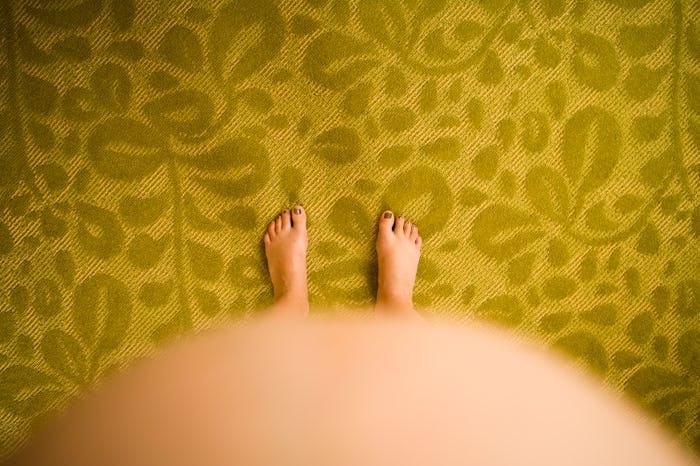This Is Just Unfair

If Your Feet Are Flat After Pregnancy, You’re Not Alone
“Arch support” has entered the chat.
Pregnancy is not for the faint of heart. Yes, it’s a beautiful miracle to bring life into the world, but it’s also no easy task. Being pregnant causes so many bodily changes, from morning sickness and lightning crotch to postpartum hair loss and even tooth decay. If you suddenly notice your shoes aren’t fitting how they used to, you may also wonder if pregnancy can cause flat feet? You can definitely lose some of that arch to the process, experts say.
Can pregnancy cause flat feet?
Yep, it’s common for your feet to go up a shoe size (or more) during pregnancy, says Dr. Victor Klein, M.D., OB-GYN at Northwell Health, and for the arches in the feet to collapse and become flat. He has seen both things happen countless times in his 40 years of practice. So, what gives?
“There are many physiological changes during pregnancy, including in the musculoskeletal system — that includes the extremities,” Klein says. “The average weight gain is 25 to 35 pounds when you’re pregnant. That changes some of the stress on the musculoskeletal system. Hormones [cause] an increased laxity and looseness of the joints and ligaments.”
The hormone he’s referring to is relaxin, which helps the bones of your pelvis spread out and make room to birth a baby. It’s not selective about what it relaxes, though, and the loosening of all your body’s joints and ligaments has been known to lead to back pain and even clumsiness during pregnancy. While it’s a helpful little hormone your body produces to make giving birth possible, relaxin is also part of why your feet seem to be spreading out.
“Relaxin affects all the ligaments. We have ligaments and tendons that help hold the arch up, so when those get relaxed or stretched out, then it can cause the arch to slowly fall where it’s flat,” says Dr. Lori Grant, DPM, podiatrist at Orlando Health.
How do I fix my flat feet after pregnancy?
Unfortunately, there’s really no way to make your arches come back if they’ve fallen during your pregnancy. “Most of the time that becomes your new normal,” says Grant. “With the help of orthotics, or orthopedic footwear, wearing those can help maybe reconstruct the structure of the arch.”
Orthopedic footwear doesn’t mean your grandma and grandpa’s shoes, Grant notes. She recommends brands like Birkenstock for their built-in arches, and Vionic, a footwear brand endorsed by the American Podiatric Medical Association.
If your feet being a little flatter doesn’t cause any issues, great. But having lower arches, or none at all, can cause some new discomforts you’re not used to.
“Your feet are your foundation. Once your foundation changes, that can affect your knees and your your hips,” says Grant. “Also, when your feet get flatter, they get wider. You may notice, ‘Gosh, there are certain shoes I can't wear anymore.’ [You want to wear] shoes with a wider toe bump, and you would also need to start looking for shoes that have more arch to them. There are also over-the-counter arch supports that you can use in shoes that already have arch support built into them, that help to take the pressure off of your knees and your hips.”
Having low arches or flat feet can put you at risk for developing plantar fasciitis, Grant says. This condition occurs when the tissue running along the arch of your foot and connecting to your heel becomes inflamed and painful. If you start experiencing heel pain, bring it up with your doctor.
So, you may have to toss your old faithful ballet flats and donate some pairs of shoes that just don’t fit well anymore. It can be hard to part with a really great pair of shoes, but your joints will thank you.
Experts:
Dr. Victor Klein, M.D., OB-GYN at Northwell Health and vice chairman of Obstetrics & Gynecology at North Shore University Hospital
Dr. Lori Grant, DPM, podiatrist at Orlando Health